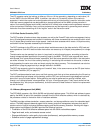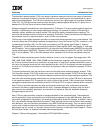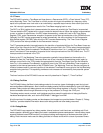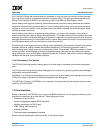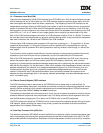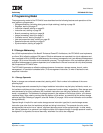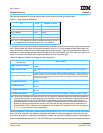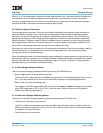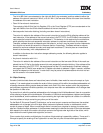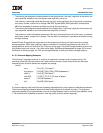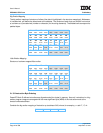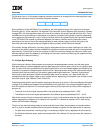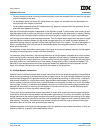
User’s Manual
PPC440x5 CPU Core Preliminary
Page 40 of 589
prgmodel.fm.
September 12, 2002
Data storage operands for storage access instructions have the following characteristics.
The alignment of the operand effective address of some storage access instructions may affect performance,
and in some cases may cause an Alignment exception to occur. For such storage access instructions, the
best performance is obtained when the storage operands are aligned. Table 2-2 summarizes the effects of
alignment on those storage access instruction types for which such effects exist. If an instruction type is not
shown in the table, then there are no alignment effects for that instruction type.
Cache management instructions access cache block operands, and for the PPC440x5 core the cache block
size is 32 bytes. However, the effective addresses calculated by cache management instructions are not
required to be aligned on cache block boundaries. Instead, the architecture specifies that the associated low-
order effective address bits (bits 27:31 for PPC440x5) are ignored during the execution of these instructions.
Table 2-1. Data Operand Definitions
Storage Access Instruction
Type
Operand
Length
Addr[28:31] if aligned
Byte (or String) 8 bits 0bxxxx
Halfword 2 bytes 0bxxx0
Word (or Multiple) 4 bytes 0bxx00
Doubleword (AP only) 8 bytes 0bx000
Quadword (AP only) 16 bytes 0b0000
Note: An “x” in an address bit position indicates that the bit can be 0
or 1 independent of the state of other bits in the address.
Table 2-2. Alignment Effects for Storage Access Instructions
Storage Access
InstructionType
Alignment Effects
Integer load/store halfword
Broken into two byte accesses if crosses 16-byte boundary (EA[28:31] = 0b1111); otherwise
no effect
Integer load/store word
Broken into two accesses if crosses 16-byte boundary (EA[28:31] > 0b1100); otherwise no
effect
Integer load/store multiple or string
Broken into a series of 4-byte accesses until the last byte is accessed or a 16-byte boundary is
reached, whichever occurs first. If bytes remain past a 16-byte boundary, resume accessing 4
bytes at a time until the last byte is accessed or the next 16-byte boundary is reached, which-
ever occurs first; repeat.
AP load/store halfword
Alignment exception if crosses 16-byte boundary (EA[28:31] = 0b1111); otherwise no effect
(see note)
AP load/store word
Alignment exception if crosses 16-byte boundary (EA[28:31] > 0b1100); otherwise no effect
(see note)
AP load/store doubleword
Alignment exception if crosses 16-byte boundary (EA[28:31] > 0b1000); otherwise no effect
(see note)
AP load/store quadword
Alignment exception if crosses 16-byte boundary (EA[28:31] ≠ 0b0000); otherwise no effect
Note: An auxiliary processor can specify that the EA for a given AP load/store instruction must be aligned at the
operand-size boundary, or alternatively, at a word boundary. If the AP so indicates this requirement and the
calculated EA fails to meet it, the PPC440x5 core generates an Alignment exception. Alternatively, an
auxiliary processor can specify that the EA for a given AP load/store instruction should be “forced” to be
aligned, by ignoring the appropriate number of low-order EA bits and processing the AP load/store as if
those bits were 0. Byte, halfword, word, doubleword, and quadword AP load/store instructions would ignore
0, 1, 2, 3, and 4 low-order EA bits, respectively.



